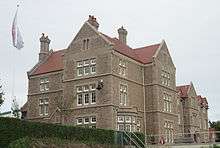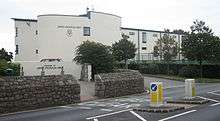Jersey College for Girls
| Motto |
Nisi Dominus Frustra (All without the Lord is in vain) |
|---|---|
| Established | 1880 |
| Type | Fee paying provided school[1] |
| Head Master | Carl Howarth |
| Founders | States of Jersey |
| Location |
Mont Millais Saint Saviour Jersey |
| Students | 712 |
| Gender | Girls |
| Ages | 11–18 |
| Houses | 6 |
| Colours | Red and Grey |
| Close links | Victoria College, Jersey |
| Rival | Ladies College, Guernsey Beaulieu Convent, Jersey |
| Website |
www |

Jersey College for Girls (commonly abbreviated as "JCG") is a fee paying States of Jersey-provided school[2] for girls located in Saint Saviour, Jersey, Channel Islands. It currently has around 712 students.
History 1880–1999
The situation for the education of girls in Jersey from the mid-19th century lagged behind provision for boys. Victoria College had been opened for boys, on the pattern of English public schools, in 1852. The well-to-do and the élite classes continued to employ governesses or to send their daughters to schools in France or England; other classes relied on the existing elementary schools in Jersey. Jersey people of influence gathered at the Grove Place Wesleyan Chapel in Saint Helier on 28 November 1879 and decided to set up a limited liability company to further a plan to provide a college for girls in Jersey. The then Bailiff of Jersey, Sir Robert Pipon Marett, became patron of the enterprise and an advertisement appeared in the British Press and Jersey Times in June 1880 to announce the forthcoming opening of the new college in September of that year: "It is designed to give to the daughters of residents and others, at an extremely moderate rate, an education of the highest order. Its promoters have long felt there is a pressing need for such an institution in Jersey". The school was opened in September 1880 as Jersey Ladies' College, located at Adelaide House in Roussel Street, Saint Helier. Girls were put in for Oxford and Cambridge Local Examinations and Matriculation of London University, and those who had studied in France were able to take the Brevet de capacité in Paris. In 1883 3 students achieved distinction in the Matriculation Examination of London University; the first ladies to have matriculated from Jersey.[3]
In 1887 the Ladies' College acquired property at La Pouquelaye, fronting Rouge Bouillon, in Saint Helier. A new building was constructed (architect: Adolphus Curry (1848–1910)),[4] and the school moved to the new site in 1888. This building has been called "one of the most identifiable buildings in the island".[5] After the First World War the school acquired the neighbouring Mont Cantel site for use as a junior school. The school was purchased in 1928 by the Church of England Schools' Trust. The school changed its name to the Jersey College for Girls, and in 1935 was taken over by the States of Jersey. The Germans occupying Jersey during World War II used the school building first as a barracks and then as a naval hospital.[6]
Since the move of the college to a new site, the 1888 building has been used for other educational functions, but has fallen into disrepair; it has now been proposed for residential redevelopment, while maintaining the historical portions of the old building.[7] The Mont Cantel site formerly occupied by the preparatory school was used by the Jersey Schools Instrumental Service and by Janvrin School, a States primary school for a number of years before being abandoned completely.
The house system
JCG has six houses at present: Austen-Bartlett, Cavell, Curie-Fry, Garrett-Anderson, Inglis, and Nightingale. Their colours are Austen-Bartlett: Light Blue, Cavell: Dark Blue, Curie-Fry: Pink, Garrett-Anderson: Red, Ingils: Green and Nightingale: Yellow. All the houses have Mascots with Austen-Bartlett: Blue fish, Cavell: Eeyore, Curie-Fry: Pink Elephant, Garrett-Anderson: Dragon, Ingils: Tortoise and Nightingale: Dangzilla (Duck). All six houses compete for the Cock House Cup which is awarded at the end of the year to the house with the most points which are decided by how well the houses have done in various house events throughout the school year. The events include Sports day, top of the pops (a dance competition), house music, house badminton, house knowledge, house shoebox appeal, house recycling, house hockey, house netball, inter-form netball, house tennis, house rounders, and the recent edition of house plays. The houses also raise money for charities throughout the year. The house year starts before the Easter break when the new house captains, prefects, head girl, deputy head girl, music captains, sport captains and Eco captains are welcomed and the house cup is awarded.
The current College site

With increasing sixth-form collaboration between JCG and Victoria College and a need to provide new facilities, it was decided to move the college to a new site. The end of boarding provision at Victoria College meant that College House, built as a boarding house for Victoria College in 1901 (architect: Edmund Berteau (1861–1935))[4] and used as the Feldkommandantur by the German occupying forces 1940-1945,[8] was available for redevelopment and re-use by JCG. A new wing was added behind the 1901 building with further facilities built in front on part of College Field. The transformation was [5] designed by ArchitecturePLB (formerly Plincke, Leaman and Browning).[9][10] In 1999, Jersey College for Girls moved to the new site.
Students

In its new location, the school now has approximately 712 students.
See also
References
- ↑ Education (Provided Schools) (Jersey) Regulations 2005
- ↑ "States reduces funding for fee-paying schools in Jersey", BBC News, 29 January 2010.
- ↑ British Press and Jersey Times, 12 July 1883
- 1 2 Buildings in the Town and Parish of Saint Helier, Brett, National Trust for Jersey 1977
- 1 2 "Old JCG Building", BBC Jersey, 4 December 2006 (accessed 21 July 2010).
- ↑ Balleine's History of Jersey, Marguerite Syvret and Joan Stevens (1998) ISBN 1-86077-065-7
- ↑ "Old Jersey College for Girls site set for redevelopment", BBC News, 4 February 2010.
- ↑ Balleine's History of Jersey, Marguerite Syvret and Joan Stevens (1998) ISBN 1-86077-065-7
- ↑ Dan O'Neill, "Jersey College for Girls: Lesson Plan: AJ Building Study", Architects Journal, 15 February 2001.
- ↑ Mark Dudek, Architecture of Schools: The New Learning Environments (Architectural Press, 2000), ISBN 978-0-7506-3585-1, p. 103. Excerpt available at Google Books.
External links
- Jersey College for Girls official website.
Coordinates: 49°11′11″N 2°05′37″W / 49.1865°N 2.0936°W